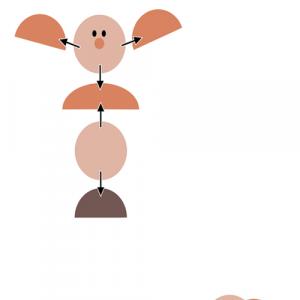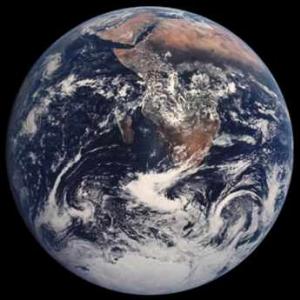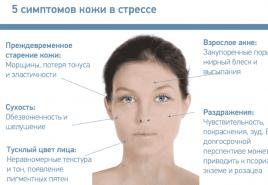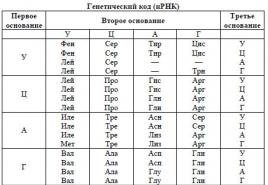EGE literature program. From the literature of the late XIX - early XX century
Codifier - This is a list of works, skills, knowledge and definitions necessary for the successful passing of the final exam in literature. This guideline for teachers and students is published annually by FIPI, so that we narrow our search and focus on the information that will be useful in the X hour. This list contains the basic elements that make up literary criticism, that is, the necessary terms and information from the history of science. They are needed to conduct a competent and in-depth analysis of books. It is the skill of analysis that is tested in tasks 16 and 17, where the student must give extended answers to questions, reason and give arguments from what he read.
So what do you need to read to pass the exam? The list of works on the exam in 2018 is also attached to the codifier. It turns out that for the final test you will not need all the books that are in school. Only some (and not the most difficult) of them were on the list. Therefore, the stage of preparation devoted to “re-reading” will not take long, given the fact that the bulk of the necessary literature has been completed recently and has not yet been forgotten. Thus, the graduate needs the codifier to save time and direct his efforts in the right direction. Use it as a fundamental and generally accepted guide to self-study.
It is worth noting that not the most difficult books were selected for the exam. For example, the beloved “Doctor Zhivago” is extremely rare in versions, since its study in the codifier of works is called “survey”, that is, there will be no full-scale verification of knowledge of the contents of this novel. In addition, in some cases, you can choose a novel. For example, from Bulgakov’s prose, a student may prefer either “The Master and Margarita” or “The White Guard”. It is not necessary to read both novels; just pick a simpler one. Thus, the list of books for the exam in literature is very useful information for those who want to minimize the time spent on preparation.
| The code | Content elements verified by KIM USE assignments |
|---|---|
| 1 |
Information on the theory and history of literature |
| 1.1 | Fiction as the art of the word. |
| 1.2 | Folklore. The genres of folklore. |
| 1.3 | Artistic image. Artistic time and space. |
| 1.4 | Content and form. Poetics. |
| 1.5 | The author's plan and its embodiment. Fiction. Fantasy. |
| 1.6 | Historical and literary process. Lit. directions and trends: classicism, sentimentalism, romanticism, realism, modernism (symbolism, acmeism, futurism), postmodernism. |
| 1.7 | Literary birth: epic, lyrics, lyroepos, drama. Genres of litas: novel, epic novel, novel, story, essay, parable; poem, ballad; lyric poem, song, elegy, message, epigram, ode, sonnet; comedy, tragedy, drama. |
| 1.8 | Author's position. Subject. Idea. The issue. Plot. Composition. Epigraph. Antithesis. The stages of development of the action: exposure, set, climax, denouement, epilogue. Lyrical digression. Conflict. Narrator. The image of the author. Character. Interior. Character. A type. Lyrical hero. The system of images. Portrait. Landscape. Talking last name. Remark. “Eternal themes” and “eternal images” in literature. Pathos. The plot. Speech characteristics of the hero: dialogue, monologue; inner speech. Tale. |
| 1.9 | Detail. Symbol. Subtext. |
| 1.10 | Psychologism. Nationality Historicism |
| 1.11 | Tragic and comic. Satire, humor, irony, sarcasm. Grotesque. |
| 1.12 | The language of the work of art. Rhetorical question, exclamation. Aphorism. Inversion. Repeat Anaphora. Fine-expressive means in a work of art: comparison, epithet, metaphor (including personification), metonymy. Hyperbola. Allegory. Oxymoron. Soundwriting: alliteration, assonance. |
| 1.13 | Style. |
| 1.14 | Prose and poetry. Versification systems. Poetic sizes: chorea, iambic, dactyl, amphibrach, anapaest. Rhythm. Rhyme. Stanza. Dolnik. Accent verse. Blank verse. Vers libre. |
| 1.15 | Literary criticism. |
| 2 |
From Old Russian Literature |
| 2.1 | "The word about Igor's regiment" |
| 3 |
From the literature of the XVIII century. |
| 3.1 | DI. Fonvizin. The play "Undergrowth". |
| 3.2 | G.R. Derzhavin. The poem "Monument". |
| 4 |
From the literature of the first half of the XIX century. |
| 4.1 | V.A. Zhukovsky. The poem "The Sea". |
| 4.2 | V.A. Zhukovsky. Ballad "Svetlana". |
| 4.3 | A.S. Griboedov. The play "Woe from Wit." |
| 4.4 | A.S. Pushkin. Poems: “Village”, “Prisoner”, “In the depths of Siberian ores ...”, “Poet”, “To Chaadaev”, “Song of the Prophetic Oleg”, “To the Sea”, “Nanny”, “K ***” ( “I remember a wonderful moment ...”), “October 19” (“Drops his scarlet forest ...”), “Prophet”, “Winter road”, “Anchar”, “Night haze lies on the hills of Georgia ...”, “I’m you he loved: still love, maybe ... ”,“ Winter morning ”,“ Demons ”,“ Conversation of the bookseller with the poet ”,“ Cloud ”,“ I erected a miraculous monument to myself ... ”,“ The daylight went out ... ”,“ The Desert Sower of Liberty ... "," Imitations of the Qur'an "(IX." And the traveler grumbled tired of God ... ")" Elegy "(" Crazy of frenzied years ... ")," ... I visited again ... ". |
| 4.5 | A.S. Pushkin. The novel "The Captain's Daughter." |
| 4.6 | A.S. Pushkin. The poem "The Bronze Horseman". |
| 4.7 | A.S. Pushkin. The novel "Eugene Onegin." |
| 4.8 | M.Yu. Lermontov. Poems: "No, I'm not Byron, I'm different ...", "Clouds", "Beggar", "From under the mysterious, cold half-mask ...", "Sail", "Death of the Poet", "Borodino", "When the yellowing worries Niva ... ”,“ Duma ”,“ Poet ”(“ My dagger shines with gold trim ”),“ Three palm trees ”,“ Prayer ”(“ It’s difficult at the moment of life ... ”),“ And it’s boring and sad ”,“ No, I don’t love you so passionately ... "," Homeland "," Dream "(" In the midday heat in the valley of Dagestan ... ")," The Prophet "," How often, I am surrounded by a motley crowd ... "," Valerik "," I go out alone on the road…". |
| 4.9 | M.Yu. Lermontov. The poem "A song about ... the merchant Kalashnikov." |
| 4.10 | M.Yu. Lermontov. The poem "Mtsyri". |
| 4.11 | M.Yu. Lermontov. The novel "Hero of our time." |
| 4.12 | N.V. Gogol. The play The Examiner. |
| 4.13 | N.V. Gogol. The story "The Overcoat." |
| 4.14 | N.V. Gogol. The poem Dead Souls. |
| 5 |
From the literature of the second half of the XIX century. |
| 5.1 | A.N. Ostrovsky. The play "Thunderstorm". |
| 5.2 | I.S. Turgenev. The novel "Fathers and Sons." |
| 5.3 | F.I. Tyutchev. Poems: "Noon", "There is a buoyancy in the sea waves ...", "A kite has risen from a clearing ...", "There is an initial autumn ...", "Silentium!", "Not that you think nature, ...", "Wit Russia cannot be understood ... ”,“ Oh, how deadly we love ... ”,“ We \u200b\u200bare not given to predict ... ”,“ K. B. " (“I met you - and all the past ...”), “Nature is the sphinx. And the more true it is ... " |
| 5.4 | A.A. Fet. Poems: “Dawn says goodbye to the earth ...”, “With one push to drive the rook alive ...”, “Evening”, “Learn from them - from the oak, from the birch ...”, “This morning, this joy ...”, “Whisper, timid breath ... "," The night shone. The moon was full of garden. They lay ... "," Another May Night. " |
| 5.5 | I.A. Goncharov. The novel "Oblomov". |
| 5.6 | ON THE. Nekrasov. Poems: "Three", "I do not like your irony ...", "Railway", "On the road", "Yesterday, at six o'clock ...", "We are stupid people ...", "Poet and Citizen", "Elegy" ("Let the changeable fashion tell us ..."), "Oh Muse! I am at the door of the coffin ... ". |
| 5.7 | ON THE. Nekrasov. The poem "To whom it is good to live in Russia." |
| 5.8 | M.E. Saltykov-Shchedrin. Tales: “The story of how one man fed two generals”, “Wild landowner”, “Wise clerk”. |
| 5.9 | M.E. Saltykov-Shchedrin. The novel "The History of a City" (a survey study). |
| 5.10 | L.N. Tolstoy. The novel "War and Peace." |
| 5.11 | F.M. Dostoevsky. The novel "Crime and Punishment." |
| 5.12 | N.S. Leskov. One piece (at the choice of the examinee). |
| 6 |
From the literature of the late XIX - early XX century. |
| 6.1 | A.P. Chekhov. Stories: “Student”, “Ionych”, “Man in a Case”, “Lady with a Dog”, “Death of an Official”, “Chameleon”. |
| 6.2 | A.P. Chekhov. The play "The Cherry Orchard". |
| 7 |
From the literature of the first half of the XX century. |
| 7.1 | I.A. Bunin. Short Stories: "Mr. of San Francisco," "Clean Monday." |
| 7.2 | M. Gorky. The story "Old Woman Isergil." |
| 7.3 | M. Gorky. The play "At the bottom." |
| 7.4 | A.A. Block. Poems: “Stranger”, “Russia”, “Night, street, street lamp, pharmacy ...”, “In a restaurant”, “The river stretches. Flowing, sad lazily ... "(from the cycle" On the Kulikovo field ")," On the railway "," I enter dark temples ... "," Factory "," Russia "," On valor, on exploits, on glory ... " , "Oh, I want to live madly ...". |
| 7.5 | A.A. Block. The poem "The Twelve." |
| 7.6 | V.V. Mayakovsky. Poems: “Could you?”, “Listen!”, “Violin and a bit of nervousness”, “Lilichka!”, “Yubileinoe”, “Sitting around”, “Nate!”, “Good attitude to horses”, “Extraordinary adventure” , who was with Vladimir Mayakovsky in the summer at the cottage ”,“ Giveaway ”,“ Letter to Tatyana Yakovleva ”. |
| 7.7 | V.V. Mayakovsky. The poem "Cloud in pants." |
| 7.8 | S.A. Yesenin. Poems: "Goy you, Russia, my dear! ..", "Do not wander, do not wrinkle in the bush of crimson ...", "We are now leaving a little ...", "Letter to the mother", "Sleeping grass. The plain is dear ... "," You are my Shagane, Shagane ... "," I do not regret, I do not call, I do not cry ... "," Soviet Russia "," The road thought of a red evening ... "," Singing hewn horns ... "," Russia " , “Pushkin”, “I am walking the valley. At the back of the cap ... "," Low house with blue shutters ... ". |
| 7.9 | M.I. Tsvetaeva. Poems: “To my poems written so early ...”, “Poems to the Bloc” (“Your name is a bird in your hand ...”), “Who is made of stone, who is made of clay ...”, “Longing for home! For a long time ... ”,“ Books in red binding ”,“ Grandma ”,“ Seven hills - like seven bells! .. ”(from the cycle“ Poems about Moscow ”). |
| 7.10 | O.E. Mandelstam. Poems: "Notre Dame", "Insomnia. Homer. Tight sails ... "," For the explosive valor of the centuries to come ... "," I returned to my city, familiar to tears ... ". |
| 7.11 | A.A. Akhmatova. Poems: “The song of the last meeting”, “Gripped her hands under a dark veil ...”, “I don’t need odic ratifications ...”, “I had a voice. He called comfortingly ... "," Native land "," Cried autumn, like a widow ... "," Seaside sonnet "," There are days before spring ... "," Not with those who left the earth ... "," Poems about St. Petersburg "," Courage. " |
| 7.12 | A.A. Akhmatova. The poem "Requiem". |
| 7.13 | M.A. Sholokhov. The novel "Quiet Don". |
| 7.14 | M.A. Sholokhov. The story "The fate of man." |
| 7.15A | M.A. Bulgakov. The novel "The White Guard" (choice is allowed). |
| 7.15B | M.A. Bulgakov. The novel "The Master and Margarita" (choice is allowed). |
| 7.16 | A.T. Twardowski. Poems: "The whole point is in a single covenant ...", "In memory of the mother" ("In the land where they were taken with a herd ..."), "I know, no fault of mine ...". |
| 7.17 | A.T. Twardowski. The poem "Vasily Terkin" (chapters "Crossing", "Two Soldiers", "Duel", "Death and the Warrior"). |
| 7.18 | B.L. Parsnip. Poems: “February. Get ink and cry! .. ”,“ Definition of poetry ”,“ In everything I want to get there ... ”,“ Hamlet ”,“ Winter night ”(“ It's nice, it's nice all over the world ... ”),“ Nobody will be in the house ... ”,“ Snow is falling ”,“ About these verses ”,“ To love others is a heavy cross ... ”,“ Pines ”,“ Hoarfrost ”,“ July ”. |
| 7.19 | B.L. Parsnip. The novel "Doctor Zhivago" (a review study with fragment analysis). |
| 7.20 | A.P. Platonov. One piece (at the choice of the examinee). |
| 7.21 | A.I. Solzhenitsyn. The story "Matrenin yard." |
| 7.22 | A.I. Solzhenitsyn. The story "One Day of Ivan Denisovich." |
| 8 |
From the literature of the second half of the twentieth century. |
| 8.1 | Prose of the second half of the XX century. F. Abramov, C.T. Aitmatov, V.P. Astafiev, V.I. Belov, A.G. Bitov, V.V. Bykov, V.S. Grossman, S.D. Dovlatov, V.L. Kondratiev, V.P. Nekrasov, E.I. Nosov, V.G. Rasputin, V.F. Tendryakov, Yu.V. Trifonov, V.M. Shukshin (works of at least three authors of choice). |
| 8.2 | Poetry of the second half of the 20th century B.A. Akhmadulina, I.A. Brodsky, A.A. Voznesensky, V.S. Vysotsky, E.A. Evtushenko, N.A. Zabolotsky, Yu.P. Kuznetsov, L.N. Martynov, B.Sh. Okudzhava, N.M. Rubtsov D.S. Samoilov, B.A. Slutsky, V.N. Sokolov, V.A. Soloukhin, A.A. Tarkovsky (poems of at least three authors of choice). |
| 8.3 | Dramaturgy of the second half of the twentieth century. A.N. Arbuzov, A.V. Vampilov, A.M. Volodin, V.S. Rozov, M.M. Roshchin (a work of one author by choice). |
Poems from the codifier
The program does not include many verses, which also facilitates the preparation process. All these poems are related thematically. Therefore, their systematic reading guarantees no problems with task 16, where it is necessary to select similar works by analogy and tell them what unites them with the one given in the question. Of course, you don’t need to learn them by heart, but you can make thematic collections of poetic works for yourself and write out your impression of each of them.
- V.A. Zhukovsky: “Sea”, Ballad “Svetlana”
- A.S. Pushkin. Pushkin’s lyrics: “Village”, “Prisoner”, “In the depths of Siberian ores ...”, “Poet”, “To Chaadaev”, “Song of the Prophetic Oleg”, “To the Sea”, “Nanny”, “K ***” (“I remember a wonderful moment ...”), “October 19” (“Drops his scarlet forest ...”), “Prophet”, “Winter road”, “Anchar”, “Night haze lies on the hills of Georgia ...”, “I Loved you: love still, maybe ... "," Winter morning "," Demons "," Conversation of the bookseller with the poet "," Cloud "," I erected a miraculous monument to myself ... "," Daylight shined ... "," Desert freedom sower ... "," Imitations of the Qur'an "(IX." And the traveler grumbled tired of God ... ")" Elegy "(" Crazy of frenzied years ... ")," ... I visited again ... ". The poem "The Bronze Horseman".
- M.Yu. Lermontov: “No, I'm not Byron, I'm different ...”, “Clouds”, “Beggar”, “From under the mysterious, cold half-mask ...”, “Sail”, “Death of the Poet”, “Borodino”, “When the yellowing worries Niva ... ”,“ Duma ”,“ Poet ”(“ My dagger shines with gold trim ”),“ Three palm trees ”,“ Prayer ”(“ It’s difficult at the moment of life ... ”),“ And it’s boring and sad ”,“ No, I don’t love you so passionately ... "," Homeland "," Dream "(" In the midday heat in the valley of Dagestan ... ")," The Prophet "," How often, I am surrounded by a motley crowd ... "," Valerik "," I go out alone on the road…". The poem "A song about ... the merchant Kalashnikov." The poem "Mtsyri".
- ON THE. Nekrasov: “Three”, “I do not like your irony ...”, “Railway”, “On the road”, “Yesterday, at six o’clock ...”, “You and I are stupid people ...”, “Poet and Citizen”, "Elegy" ("Let the changeable fashion tell us ..."), "Oh Muse! I'm at the door of the coffin ... ". The poem "To whom it is good to live in Russia."
- A.A. Fet: “Dawn says goodbye to the earth ...”, “With one push to drive the rook alive ...”, “Evening”, “Learn from them - from the oak, from the birch ...”, “This morning, this joy ...”, “Whisper, timid breath ... "," The night shone. The moon was full of garden. They lay ... "," Another May Night. "
- A.A. Block: “Stranger”, “Russia”, “Night, street, lantern, pharmacy ...”, “In a restaurant”, “The river stretches. Flowing, sad lazily ... "(from the cycle" On the Kulikovo field ")," On the railway "," I enter dark temples ... "," Factory "," Russia "," On valor, on exploits, on glory ... " , "Oh, I want to live madly ...". The poem "The Twelve"
- V.V. Mayakovsky: “Could you?”, “Listen!”, “Violin and a little nervous”, “Lilichka!”, “Yubileinoe”, “Sitting around”, “Nate!”, “Good attitude to horses”, “Extraordinary adventure , who was with Vladimir Mayakovsky in the summer at the cottage ”,“ Giveaway ”,“ Letter to Tatyana Yakovleva ”. The poem "Cloud in pants"
- S.A. Yesenin: "Goy you, Russia, my dear! ..", "Do not wander, do not crumple in the bush of crimson ...", "We are now leaving a little ...", "Letter to the mother", "Sleeping grass. The plain is dear ... "," Shagane you are mine, Shagane ... "," I do not regret, I do not call, I do not cry ... "," Soviet Russia "," The road thought of a red evening ... "," Singing hewn horns ... "," Rus , “Pushkin”, “I am walking the valley. At the back of the cap ... "," Low house with blue shutters ... "
- M.I. Tsvetaeva: “To my poems written so early ...”, “Poems to the Bloc” (“Your name is a bird in your hand ...”), “Who is made of stone, who is made of clay ...”, “Longing for home! For a long time ... ”,“ Books in red binding ”,“ Grandma ”,“ Seven hills - like seven bells! .. ”(from the cycle“ Poems about Moscow ”)
- O.E. Mandelstam: Notre Dame, Insomnia. Homer. Tight sails ... "," For the explosive valor of the centuries to come ... "," I returned to my city, familiar to tears ... "
- A.A. Akhmatova: “Song of the last meeting”, “Gripped her hands under a dark veil ...”, “I don’t need anything
odic rati ... "," I had a voice. He called comfortingly ... "," Native land "," Cried autumn, like a widow ... "," Seaside sonnet "," There are days before spring ... "," Not with those who left the earth ... "," Poems about St. Petersburg "," Courage. " The poem "Requiem". - B.L. Parsnip: “February. Get ink and cry! .. ”,“ Definition of poetry ”,“ In everything I want to get there ... ”,“ Hamlet ”,“ Winter night ”(“ It's nice, it's nice all over the world ... ”),“ Nobody will be in the house ... ”,“ Snow is falling ”,“ About these verses ”,“ To love others is a heavy cross ... ”,“ Pines ”,“ Hoarfrost ”,“ July ”.
- Poems of at least three authors of choice: B.A. Akhmadulina, I.A. Brodsky, A.A. Voznesensky, V.S. Vysotsky, E.A. Evtushenko, N.A. Zabolotsky, Yu.P. Kuznetsov, L.N. Martynov, B.Sh. Okudzhava, N.M. Rubtsov D.S. Samoilov, B.A. Slutsky, V.N. Sokolov, V.A. Soloukhin, A.A. Tarkovsky. Interesting? Save on your wall!
Literature is the primary classic school subject, often selected for the Unified State Exam. The exam in the literature is changed every time to complicate the delivery process. For 2018, changes are also planned. Graduates need to be well prepared to pass the test. They must read the works of the school curriculum, learn to correctly express their thoughts, remember the specifics of the profile KIMs.
Who needs to take the literature exam
Unified State Exam 2018 on literature is required for future students of linguistic, philological, ethnographic faculties. Other departments require the results of the Unified State Examination for:
- obtaining the specialty of a translator;
- teaching creative professions - painting, theater, vocals;
- film specialty training;
- teaching journalism, writing skills.
In the Unified State Exam 2018, literature is selected not only because of the specialty received by students. It all depends on the requirements of a particular school. The maximum possible result is possible when his choice is thought out in advance, voiced, documented. Tracking the news related to this test, they study all its subtleties. At the same time, the composition demonstrates the creative abilities of the applicant. They are developed in advance by writing draft texts. In addition to the literary exam, university leadership may add other tests. Future producers pass maths, actors pass a creative contest. The exact requirements are found out by the members of the examination committee, on the university website.
What changes are planned
The format of the exam in the literature for next year will change as a result of improving KIMov. Recent decisions of the Ministry of Education and Science indicate that A single state exam will be complicated. The structure of current tickets excludes questions with a short answer. The new format increases the number of tasks chosen by the graduate independently. Now they compare the text with one work instead of two. Evaluation criteria are significantly tightened. For a detailed answer, you need to use 50 words, the essay received a norm of at least 200 words. Compliance with the rules of the Russian language is required.
For tasks 9 and 16, changes in the exam in the literature provide for the abolition of the rationale for the example selected for comparison. The final essay received a fourth theme. The criteria for assigning grades to the tasks with a detailed answer, their numbers 8, 9, 15, 16, 17, have been revised. Other provisions of the exam in the literature of 2018 do not differ from last year's final test.
Current demo version
A demo version of the latest version of the exam in literature has been published on the Internet. It was prepared by FIPI. Its task is to enable examiners to familiarize themselves with the type, structure, typology of exam forms, and the procedure for filling them out. The exam in literature in 2018 is divided into two parts. Tasks total 17. They must be completed in 235 minutes. Exceeding the time limit is not allowed.
The final essay is surrendered three times. Format - composition, exposition, writing time 4 hours. The result is made out as a “set-off” or “not-set”. The minimum passing score is 32 points, "excellent" will require a score of 57 points. Graduates preparing for the Unified State Exam should understand that their answers are assessed for the presence of their own thoughts, the depth of understanding of the raised problem. For composition relevant: sequence of presentation, consistency, compliance with the norms of the Russian language.
- Download demo: ege-2018-lit-demo.pdf
- Download archive with specification and codifier: ege-2018-lit-demo.zip
The main directions of exam preparation
Preparation for the exam in this subject begins with a study of its current demo. The goal is to understand the structure, form, logic of the test. You can download the demo on thematic sites dedicated to the Unified State Exam. The theoretical material studied throughout the entire period of study must be repeated. Tests for 2016-2017 are being passed, several essays are written on standard exam topics. Special attention to reading recommended literature. The list includes 145 works, each of them is used in the preparation of examination tasks. Difficult topics are worked out with a tutor. When the test fails, the non-passed exam is retaken after 12 months. Test results are appealed. The procedure is very complicated, unpleasant, lengthy. It is not worth it to make a failure, because time destroys the knowledge gained at school, so passing the USE will become even more difficult.
Every year on the official website of FIPI, demos of the USE for the current year are published.
08.21.2017 draft documents were presented that govern the structure and content of the KIM USE in 2018 (including the demo version of the USE in literature).
There are documents that regulate the structure and content of KIM - codifier and specification.
Unified State Exam in Literature 2018 - a demo with answers and criteria from FIPI
Total tasks - 17; of them according to the type of tasks: with a short answer - 12; with a detailed answer - 5; by difficulty level: B - 12; P - 4; IN 1.
The maximum point for work is 57 (significant changes compared to last year).
Changes in the Unified State Examination of 2018 on literature in comparison with 2017
1. The criteria for evaluating detailed answers have been improved and brought closer to OGE.
2. The algorithm of the expert’s actions is simplified when evaluating detailed answers of different types; greater transparency of assessment formation for individual tasks and work in general (for the expert and the examinee) was ensured. The changes are aimed at increasing the objectivity of evaluating the examination paper and at strengthening the continuity between the forms of final control at different levels of school education.
3. Strengthened control over the quality of the speech of the examinee (speech is evaluated in the answers to all tasks).
4. The requirements for the performance of comparative tasks 9 and 16 have been clarified: there is no requirement in the instructions for them to justify the choice of an example for comparison, which is reflected in the criteria for their evaluation.
5. The fourth task is introduced in part 2 (the themes of the essays vary depending on the genre-clan variety of literary material and the literary era).
6. The maximum score for all work has been increased from 42 to 57 points.
7. The procedure for appointing 3 experts has been clarified.
8. The instructions for work and individual tasks have been improved (they more fully, sequentially and clearly reflect the requirements of the criteria, give a clear idea of \u200b\u200bwhat actions and in what logic the examiner should perform)
The duration of the exam in literature
The duration of the exam in the literature is 3 hours 55 minutes (235 minutes).
Distribution of KIM tasks by content, types of skills and methods of action
The list of content elements checked for the USE is presented in section 1 of the codifier. The list contains eight subsections. On the basis of subsection 1 “Information on the theory and history of literature”, in the wording of tasks certain terms and concepts are used.
The remaining subsections distribute works of fiction in accordance with various literary eras:
From old Russian literature;
From the literature of the XVIII century .;
From the literature of the first half of the XIX century .;
From the literature of the second half of the XIX century .; -
from the literature of the late XIX - early XX century .;
From the literature of the first half of the XX century .;
From the literature of the second half of the twentieth century - beginning of the twenty-first century;
To compile the KIM USE, these subsections are combined into substantive blocks. In each version of the examination work, tasks from three substantive blocks are necessarily present:
1) Old Russian literature, literature of the XVIII century. and the first half of the XIX century .;
2) literature of the second half of the XIX century .;
3) literature of the end of the XIX century - beginning of the XXI century .;
The purpose of the demo option in the literature is to enable any participant in the exam and the general public to get an idea about the structure of future KIM, the number of tasks, their form and level of difficulty.
The criteria for evaluating the performance of tasks with a detailed answer, included in this option, give an idea of \u200b\u200bthe requirements for completeness and correctness of recording a detailed answer.
Demo USE Literature 2018 with answers and criteria
| Job Option + Answers | Download demo 2018 |
| Specification | demo variant literatura ege |
| Codifier | kodifikator |
Changes in KIM Unified State Exam of 2018 on literature in comparison with 2017
The criteria for evaluating detailed answers have been improved and brought closer to OGE. The algorithm of the expert’s actions is simplified when evaluating detailed answers of different types; greater transparency of assessment formation for individual tasks and work in general (for the expert and the examinee) was ensured. The changes are aimed at increasing the objectivity of evaluating the examination paper and at strengthening the continuity between the forms of final control at different levels of school education. Strengthened control over the quality of speech of the examinee (speech is assessed in the answers to all tasks).
The requirements for the implementation of comparative tasks 9 and 16 have been clarified: the instructions for them do not require the rationale for choosing an example for comparison, which is reflected in the criteria for their evaluation.
The fourth task is introduced in part 2 (the themes of the essays vary depending on the genre-clan variety of literary material and the literary era).
Maximum score for all work increased from 42 to 57 points. The procedure for appointing 3 experts has been clarified.
Instructions for work and individual tasks have been improved (they more fully, sequentially and clearly reflect the requirements of the criteria, give a clear idea of \u200b\u200bwhat actions and in what logic the examiner should perform).
The duration of the exam in literature
The duration of the exam in the literature is 3 hours 55 minutes (235 minutes).
The structure of KIM USE
In the examination paper, two parts are distinguished and end-to-end numbering of tasks is adopted. KIM includes 17 tasks that vary in form and level of difficulty.
Part 1 proposes the implementation of tasks containing questions to the analysis of literary works. The ability of graduates to determine the main elements of the content and artistic structure of the studied works (subjects and problems, characters and events, artistic techniques, various types of paths, etc.) is tested, as well as to consider specific literary works in conjunction with the course material.
Part 2 of the work requires the participants in the exam to write a full-length detailed essay on a literary topic. Thus, one more substantial component of the course being tested is added to the literary material worked out in Part 1. The graduate is offered 4 topics.
A graduate selects only one of the proposed topics and writes an essay on it, substantiating his judgments with an appeal to the work (from memory). Writing an essay requires a large measure of cognitive independence and meets the specificity of literature as a form of art and academic discipline, which aims at forming a qualified reader with a developed aesthetic taste and need for spiritual, moral and cultural development.







